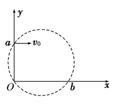问题
选择题
如图11所示,在平面直角坐标系中有一个垂直于纸面向里的圆形匀强磁场,其边界过原点O和y轴上的点a(0,L).一质量为m、电荷量为e的电子从a点以初速度v0平行于x轴正方向射入磁场,并从x轴上的b点射出磁场,此时速度方向与x轴正方向的夹角为60°.下列说法中正确的是 ( )

A.电子在磁场中运动的时间为
B.电子在磁场中运动的时间为
C.磁场区域的圆心坐标( ,
, )
)
D.电子在磁场中做圆周运动的圆心坐标为(0,-2L)
答案
BC
由图可以计算出电子做圆周运动的半径为2L,故在磁场中运动的时间为t= =
= ,A错,B正确;ab是磁场区域圆的直径,故圆心坐标为(
,A错,B正确;ab是磁场区域圆的直径,故圆心坐标为( L,
L, ),电子在磁场中做圆周运动的圆心为O′,计算出其坐标为(0,-L),所以C正确,D错误.
),电子在磁场中做圆周运动的圆心为O′,计算出其坐标为(0,-L),所以C正确,D错误.
